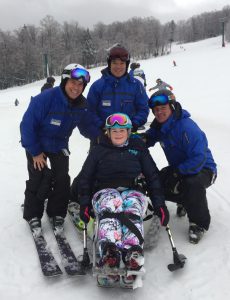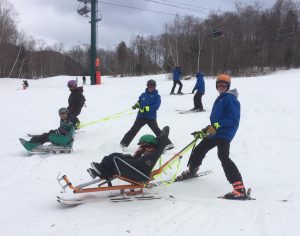Snow sports are a passion of mine; almost any day up on a mountain is a great day. By combining this passion with a bigger purpose, I’ve recently tapped into a true vein of inspiration, integrating both my professional and personal life in a wonderful, unexpected way.
Indeed, helping address the needs of patients is what gets many in the biomedical research community out of bed in the morning. The biotech sector’s shared mission is to discover new therapies and advance them to patients as quickly as possible. Yet, surrounded by all the cool scientific advances, actual patients often get forgotten. First-hand engagement with individuals that are dealing with the medical conditions we seek to address is often missing. But it shouldn’t be.
Recently that has changed for me: I volunteered this winter season to be an adaptive ski coach with New England Disabled Sports (NEDS) at Loon Mountain. The experience has been nothing short of inspiring.

NEDS has a simple but powerful mission: “through sports, to change lives affected by disabilities. ” The organization and its 200 or so coaches provide nearly 3000 lessons each year to student-athletes with a range of disabilities, including physical, cognitive, hearing or visual impairments.
I’ve primarily focused on coaching students with physical disabilities, and in particular those that require them to use one of several kinds of bucket-style sit-ski’s, e.g., a mono-ski or bi-ski of various configurations depending on the degree of independence of the student (and how much the coach needs to tether or steer the device). This type of equipment is frequently used for individuals with multiple sclerosis, spinal cord injury, Duchenne’s and other muscular dystrophies, cerebral palsy, spina bifida, stroke, traumatic brain injury, neuromuscular diseases, and other conditions where lower or upper extremities are compromised. Many of these conditions are the ones our biotech community is engaged in trying to address with new therapeutics and regenerative medicine.
Over the past few months, it’s been a real privilege to work with individual student-athletes facing down these conditions and their respective disabilities. To share some of the inspiration I’ve felt, here are six themes that I’ve learned working closely with these student-athletes so far this season.
- Attitude is everything: never accept the word “never”. Most of these students or their families have heard people say the word never, but to their credit they largely refuse to listen to it. As a new coach, I learned this right away. My first lesson was with Colleen, a wonderful and courageous teenage girl with spina bifida, who had recently had spinal tethering surgery and was wheelchair-bound. That didn’t stop her from wanting to learn how to independently bi-ski, with a totally positive can-do mentality. A few weeks later I worked with another teenager, Nico, similarly only a few months out from a spina bifida-related surgery, who was super eager to improve. Every chairlift ride he would ask me what he could do to get better on the next run. The look on his mother’s face as he skied down the slope on the last run with us was overwhelming.
 Or take nearly 9–year old Logan, who was born with a rare condition called hereditary spastic paraplegia; a totally fun, upbeat kid with a great attitude about life. Trading his crutches in for a bi-ski, he can truly rip turns down the mountain faster than the majority of skiers. As Zig Ziglar said, “Your attitude, not your aptitude, will determine your altitude” – even more true in the mountains.
Or take nearly 9–year old Logan, who was born with a rare condition called hereditary spastic paraplegia; a totally fun, upbeat kid with a great attitude about life. Trading his crutches in for a bi-ski, he can truly rip turns down the mountain faster than the majority of skiers. As Zig Ziglar said, “Your attitude, not your aptitude, will determine your altitude” – even more true in the mountains. - Changing the context can unleash unexpected strengths. Physical disabilities are often easy to see, which frequently leads to a range of (mis)perceptions from onlookers. Take Chris, a 67-year old who’s been battling primary lateral sclerosis (PLS), a neuromuscular disease, for the past decade; his speech and ability to walk are significantly compromised, presenting in a manner similar to stroke. He certainly doesn’t look or sound like a skier today. But his lifelong passion for the slopes couldn’t be kept down; with the help of other NEDS coaches over the last decade, he’s become a very capable athlete in a bi-ski, independently carving S-turns down the blue slopes all over the mountain. To watch Chris ski, you’d never know he was a patient with PLS. I saw the same from Debbie, a 55-year old woman with multiple sclerosis, that I had the pleasure of coaching for a morning a few weeks ago; while wheelchair-bound on land, on the snow she was a super-fast, very aggressive skier who loved to take her bi-ski right up to the edge of the trail (and scare the coaches tethering behind her!). When you move an individual with disabilites into a different context, like onto the slopes of the mountain, amazing things often happen.
- The excitement of adrenaline and the wind on their face. Adrenaline is one of the most basic human hormones: key to the fight-or-flight response, it’s also a trigger for thrill-seeking excitement, along with its cousins, the positive endorphins. To varying degrees, everyone wants to enjoy the rush of adrenaline from time to time. Students with disabilities, even those that can’t participate actively in skiing down the mountain, are no exception. I’ve enjoyed guiding a wonderful 22-year old young man with cerebral palsy, Ryan, down the slopes; hearing him vocalize his excitement as we carve down the mountain in a sit-ski is a sure sign he’s having a blast. The thrill of the slopes is an absolute joy to share with him.
 Finding confidence and purpose through community. Adaptive ski programs like NEDS create a great environment for student-athletes with disabilities to grow, and to increase their broader life confidence through their activity and achievement on the mountain. The story of 20-year Sam, who also has cerebral palsy, is a great example: he’s been involved in NEDS for 15 years and truly loves skiing with the NEDS community, having grown up with many in the program. With the confidence that in part he’s gained through this experience, he’s now become an intern at the Massachusetts state house this year. He’s a great young man, and I’m fortunate to have been out there with him a few times this season. Other students with disabilities in the NEDS program have now grown up to become coaches themselves, assisting the rest of us with coaching the next generation of younger athletes – bringing broader purpose to their lives and others.
Finding confidence and purpose through community. Adaptive ski programs like NEDS create a great environment for student-athletes with disabilities to grow, and to increase their broader life confidence through their activity and achievement on the mountain. The story of 20-year Sam, who also has cerebral palsy, is a great example: he’s been involved in NEDS for 15 years and truly loves skiing with the NEDS community, having grown up with many in the program. With the confidence that in part he’s gained through this experience, he’s now become an intern at the Massachusetts state house this year. He’s a great young man, and I’m fortunate to have been out there with him a few times this season. Other students with disabilities in the NEDS program have now grown up to become coaches themselves, assisting the rest of us with coaching the next generation of younger athletes – bringing broader purpose to their lives and others.- Quest for independence, one turn at a time. While not every student can become an independent skier, the lessons and equipment chosen are tailored to facilitate as much participation in the sport that a student’s condition allows. Take JB, a fun-loving 9-year old boy with Duchenne’s, whose gloves have green and red tape on them; moving down the slopes the coaches holler out a color, and JB does a great job of shifting his weight by reaching with that arm to initiate the turns in his bi-ski. Another athlete, Courtney, has progressed from a tethered bi-ski to independent snowboarding over the past couple years as her recovery from TBI continues; we had a great time boarding together a couple weekends ago. Having a student-athlete “own” as much of their snow sports experience as possible, exerting increasing amounts of control and independence on the slope, helps further reinforce confidence both on and off the mountain.
- Summiting personal mountains transcends age. In my very short tenure as an adaptive coach, I’ve now worked with student-athletes that span nearly 65 years of age: from Chris, mentioned above, to a little toddler named Mack, who is just 3-years old. Mack, who has cerebral palsy, did a number of runs in a tethered bi-ski with us one morning and ended each one with a huge smile. His excitement reminded me that skiing is indeed a lifelong sport; it’s one of the few that you can do over the span of decades. Grandparents can actively ski with their grandkids, as my parents have done with my kids. Gravity works the same on our mass regardless of our age. But coming back to NEDS, individuals of all ages have their personal mountains to climb – and I’m lucky to be part of a program that helps many of them reach their peaks.
As you can probably tell, I’ve been totally inspired by the NEDS adaptive program. It’s a fantastic group, and it’s a privilege to be a part of it. A big thank you to the NEDS staff and experienced coaches for bringing me onto the team.
Many of the individuals I’ve helped coach already benefit from important medicines discovered and developed over the past few decades, such as autoimmune therapies, anti-inflammatory agents, epilepsy drugs, or anxiety medications, etc. But they also greatly benefit from being recognized as far more than just patients; in fact, I’m hesitating to call them patients here, as these are wonderfully-engaging individuals and families trying to push themselves to be the best they can.
It’s also clear to me that even with similar physical disabilities, the unmet needs of individuals are often very different. In biomedical research, we often think of these clinical conditions at the population-level, yet there’s broad heterogeneity not only in how their symptoms present, but also of how these individuals think about their symptoms relative importance.
This leads many in biotech and clinical research to often miss important real-world, everyday needs and goals that many of these individuals have – like wanting to conquer the mountains, both the literal and figurative ones, in their lives.
NEDS, and adaptive sports programs like it, help them reach that goal.
Postscript request: New England Disabled Sports (NEDS) is a 501(c)(3) not-for-profit organization, providing adaptive sports instruction to students of all ages and abilities. It is through the generous donations of individuals, corporations and foundations that so many student-athletes living with disabilities are able to enjoy the mountains. Please consider a donation through the website or through the link here.





